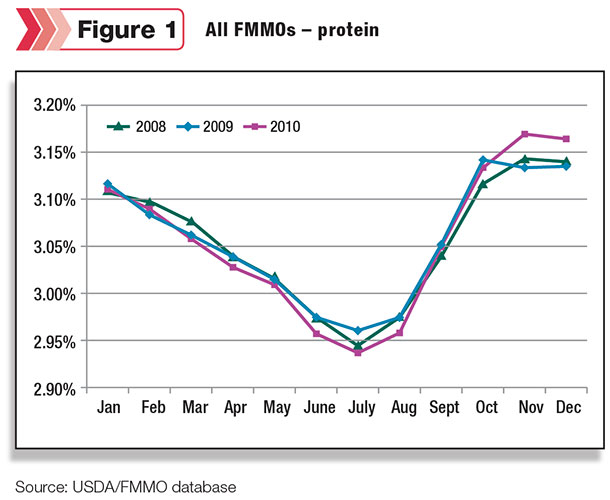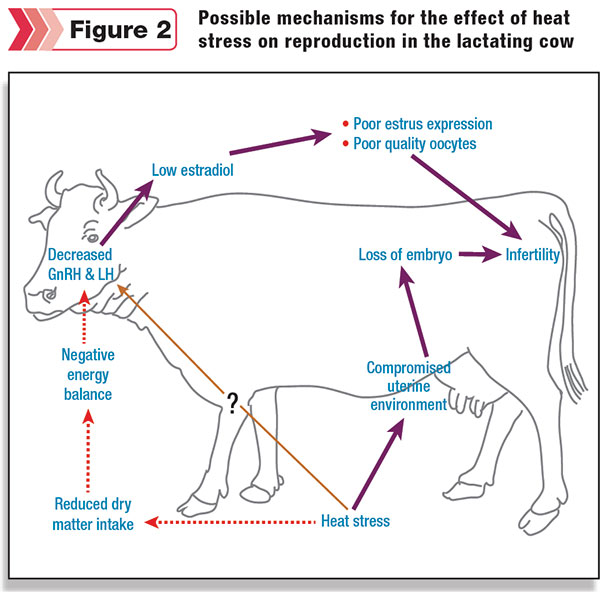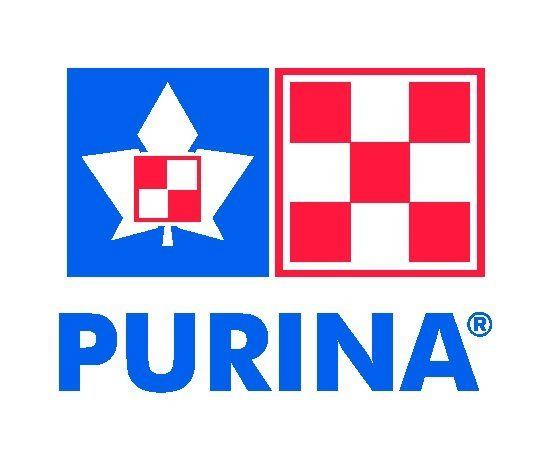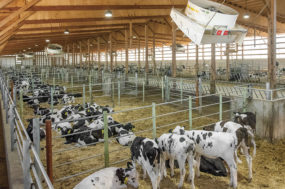Are you at risk of losing money? Much attention has been devoted to estimate the economic impact of heat stress on lactating cows; in 2003, researchers estimated that production losses in the U.S. reached $900 million. During the summer months, cows produce less milk volume and milk components.
Seasonal effects decrease milk protein from December to July and increase it from August to December, irrespective of the Federal Milk Marketing Order (FMMO) regions of the country ( Figure 1 ). More worrisome is the further potential decline in milk protein in the summer caused by heat stress. The economic losses to individuals can be substantial if not addressed properly.

There are several management and nutritional steps that can be used to minimize the impact. Keeping cows comfortable and cool is of utmost importance. Nutrition also plays a critical role. During heat stress, a cowâs dry matter intake is reduced even though her metabolic needs are the same or even higher than when within thermo-neutral conditions. The end result is that cows are prone to be in negative energy and nutrient balance.
As the quantity of nutrients consumed declines, so does the dietary protein intake. Several nutritional strategies have been proposed: offer high-quality forages, feed diets that provide glucose precursors and include rumen modifiers (i.e., yeast), buffers, minerals and antioxidants. The latter recommendation is to lower the reactive oxygen species resulting from the increased respiration rate.
Besides being a required nutrient, methionine is also a known antioxidant which can alleviate the negative impact of excessive reactive oxygen species. Often, during hot weather the dietâs crude protein density is increased to compensate for the lower intake.
However, this is not the right strategy since there is an energetic cost associated with feeding excess protein and an associated loss in the efficiency of N utilization. This would be the time to increase the concentrations of metabolizable lysine and methionine in MP in the diet if practically possible.
Cows fed amino acid-balanced diets produce more milk with higher components, particularly higher milk protein. During the summer months, it is important to look closely at the dietâs amino acid delivery. The objective during heat stress is to assure the delivery of sufficient nutrients to avoid a nutrient deficiency; feeding a methionine-enriched diet provides cows the tool to help to prevent the decay in milk components.
It is not only about milk
The impact of heat not only affects milk production and composition; it also has a negative impact on health and reproduction. These effects are also linked to lower DMI ( Figure 2 ).

Reduced DMI may inhibit the secretion of reproductive hormones (GnRH and LH), and it can also compromise the uterine environment to cause embryo losses and infertility. Keeping cows cool and well-nourished is critical to avoid early embryonic losses.
Many nutrients are required by the growing embryo to develop. Amino acids, particularly methionine, are essential to warrant a normal embryonic growth.
Therefore, at times when intake is expected to decrease, high-quality protein feed ingredients should be fed. These include fish meal, blood meal, bypass soy products or canola meal. Many of these are methionine-deficient; thus, considering adding a good-quality rumen bypass methionine source is warranted.
Here is the good news
Based on the data from the FMMO, it is tempting to conclude that there is an unavoidable seasonality in milk components. It is also clear that this effect is not limited to a specific region of the country. However, dairymen have several management and nutritional tools to help cows mitigate the effects of heat stress.
Ensuring good cow comfort and providing a nutritionally sound diet, including feeding the right amount of a rumen-protected methionine source, are practices that will help cows dodge the risk of lowering their productivity during the summer months. PD
Daniel Luchini is the manager of ruminant product technical services for Adisseo, has a Ph.D. in dairy science from the University of Wisconsin and has received seven U.S. patents.
References omitted due to space but are available upon request. Click here to email an editor.

Daniel Luchini
Manager - Ruminant Product Technical Services
Adisseo






